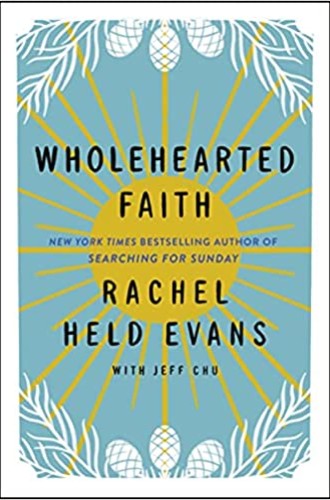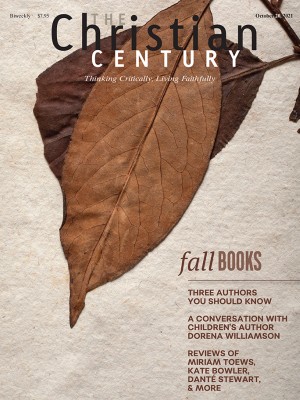The beautiful faith of Rachel Held Evans
Like all of her work, her posthumous book is warm, wise, and intimate.
In late spring of 2019, Christian writer Rachel Held Evans was hospitalized with an infection and social media was taken over by the hashtag #prayforRHE. Her coconspirator Nadia Bolz-Weber took to praying like the psalmist: heal her now, damn it. It didn’t work. The headline felt like a punch in the mouth: “Rachel Held Evans is dead at 37.” Although I never knew her, I felt like I did. Such was the warmth in her voice as an author and social media warrior.
Writer Jeff Chu, who was a seminarian when Evans died, knew her very well—and he partnered with her spouse, Daniel Jonce Evans, to bring us this surprising book from beyond the grave. The widower gave the friend access to everything Rachel had left behind: computer files and scribbled notes, outlines of essays and drafts of blog posts. The result is a fitting conclusion to her literary legacy. It’s warm, wise, and intimate, like all of her work.
Read our latest issue or browse back issues.
Like Evans’s other books, Wholehearted Faith lifts up biblical interpreters I’ve never read before and reveals enough of their insights to send me straight to the library to dig more deeply. Wil Gafney: Rachel the matriarch is never recorded praying, yet God gives her the desire of her heart. Nathan Stucky: the first sabbath is not a reward for Adam and Eve, for they’ve done no work yet. Kaitlin Curtice: a flood in the Ozarks brings death, but also new life, like baptism itself. Nachman of Breslov: there is nothing so whole as a broken heart. (Of course, these figures are perfectly well-known in many settings, so I’m displaying my ignorance here. But Evans doesn’t shame the ignorant. She delights us into knowledge on the way to wisdom.)
One can see why Evans’s critics pounce. She likes to draw out their poison to bring healing. “God needed women for survival” is a perfectly orthodox statement based on the communicatio idiomatum—and it’s clearly designed to annoy the patriarchy. “Death is something empires, not resurrection people, worry about.” True, but to look at our denominational budgets, we don’t believe it. And fire, she writes, for all its fearsomeness in scripture, can heal, cauterize, and save. Like the seeds that do not sprout without wildfire, new creation can’t come without a good burn. Amen to all of this.
There are moments in the book that make me wish Evans had managed to get that PhD that she occasionally pined for. Sure, some Jews and Eastern Orthodox Christians say they have no notion of original sin, as Evans points out. But ask the former what they make of the golden calf story and the latter what they make of Genesis 3, and you’ll get answers not a little like Augustine, or even (gasp!) John Calvin. Evans doesn’t address such complexities.
Nor does Evans like the doctrine of election. She may no longer believe that Anne Frank is in hell, “but neither can I say with any certainty what happens when we die,” she writes. But neither can anyone else, no matter what they teach in fundamentalist eastern Tennessee. Evans’s work would be more compelling if she’d engaged these doctrines at their points of strength and not simply as caricatures.
Still, I love reading Evans for the same reason I love reading other great Christian writers: she makes me want to preach. In a tribute published in these pages, I called Evans the C. S. Lewis of her time. I was thinking of her effect on my students and countless others who were inspired into ministry by her preternatural intelligence and her skewering of the evangelical establishment. I have, since then, wondered whether the comparison is inapt.
After reading Wholehearted Faith, I’m convinced that Evans was more like Barbara Brown Taylor or Brian McLaren—both luminaries very much still living, both spectacular wordsmiths, neither a credentialed academic but both renowned lecturers and best-selling authors. As Taylor and McLaren blazed their way out of evangelical expressions of Christianity, they gave others the freedom and permission to use evangelical tools (celebrity personae, conferences, media platforms) to raise up versions of faith that their former mentors now disapprove of. So too with Evans.
When I compared Evans to Lewis, the internet trolls lost their mind, as they do. One critic suggested, more sensibly, that we wait a few decades before we assess her influence. If she’s quoted in sermons then like Lewis is now, then we can talk.
But legacy weighing is not a zero-sum game. Lewis took pride in his total lack of originality. He was just passing on what the church has always taught: mere Christianity, nothing more or less. Evans was far more polemical, slaying the dragons that menace her and others. But she didn’t do apologetics, however Amazon classifies her work. She didn’t attack unbelief, nor did she even deconstruct harmful belief. She reconstructed a more beautiful belief. And Lewis, for all his purported lack of originality, did the same. There is room for more than one luminary on the high perch of Protestant sainthood.
I was first summoned to #prayforRHE while on a family pilgrimage, and the five of us did pray. When Rachel died, I noticed that my prayers didn’t stop. I still prayed for her—that God would speed her toward the beatific vision. I also noticed that I was asking her to pray for me. For trivial things: that Jesus would help me get over this next, impossible hill. For big things: a blessing on her family, and on mine.
Calvin would’ve said that Rachel was too busy with that aforementioned beatific vision to bother herself with my prayers. But he’s dead wrong. We are never not in communion with the saints, and they with us. I hope Rachel relayed my prayers to the proper authorities. She and her closest friends would roll their eyes at this, I’m sure. But I’m nothing if not earnest, so I’ll say it (sans hashtag): Saint Rachel, pray for us, and we will (still) for you.






